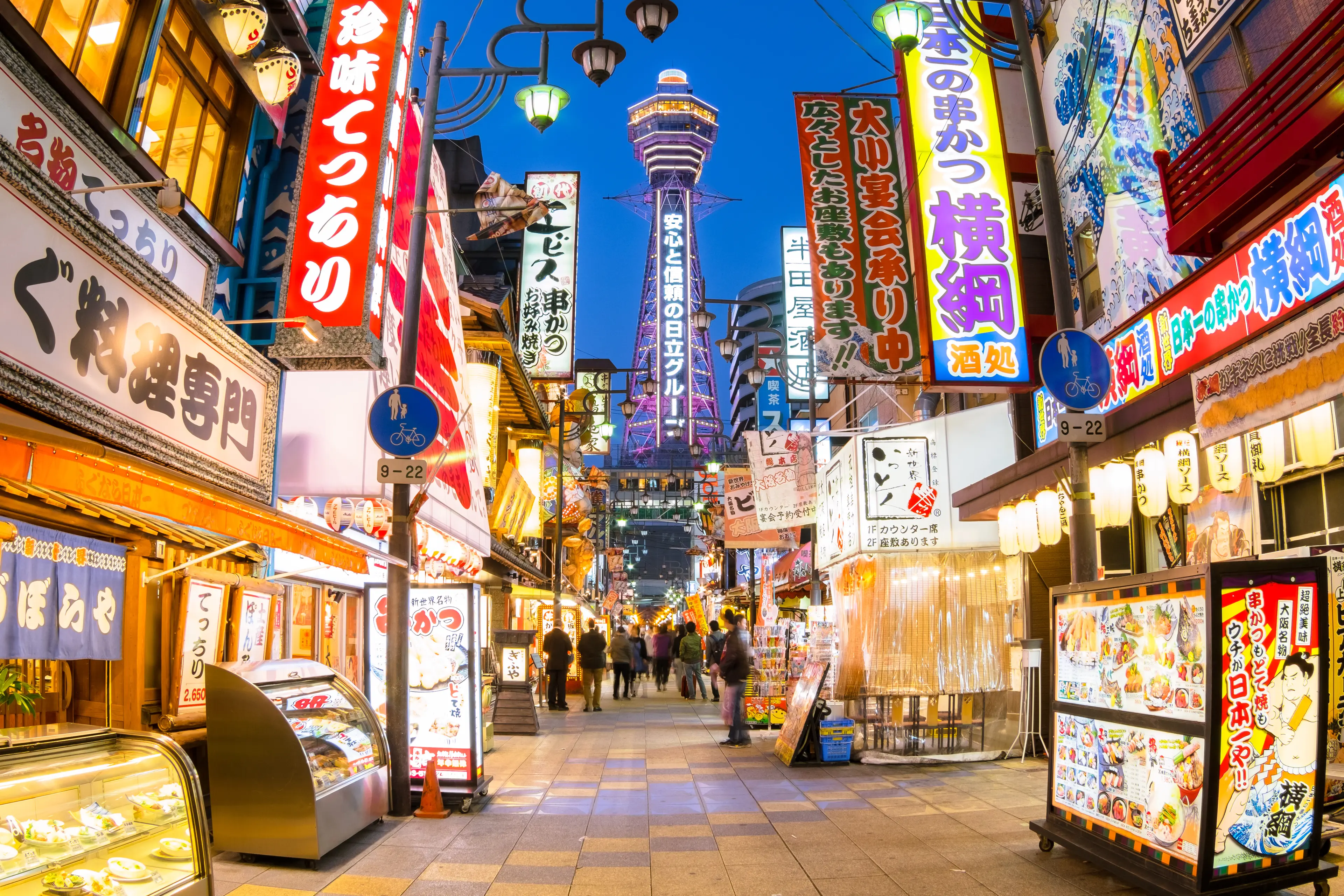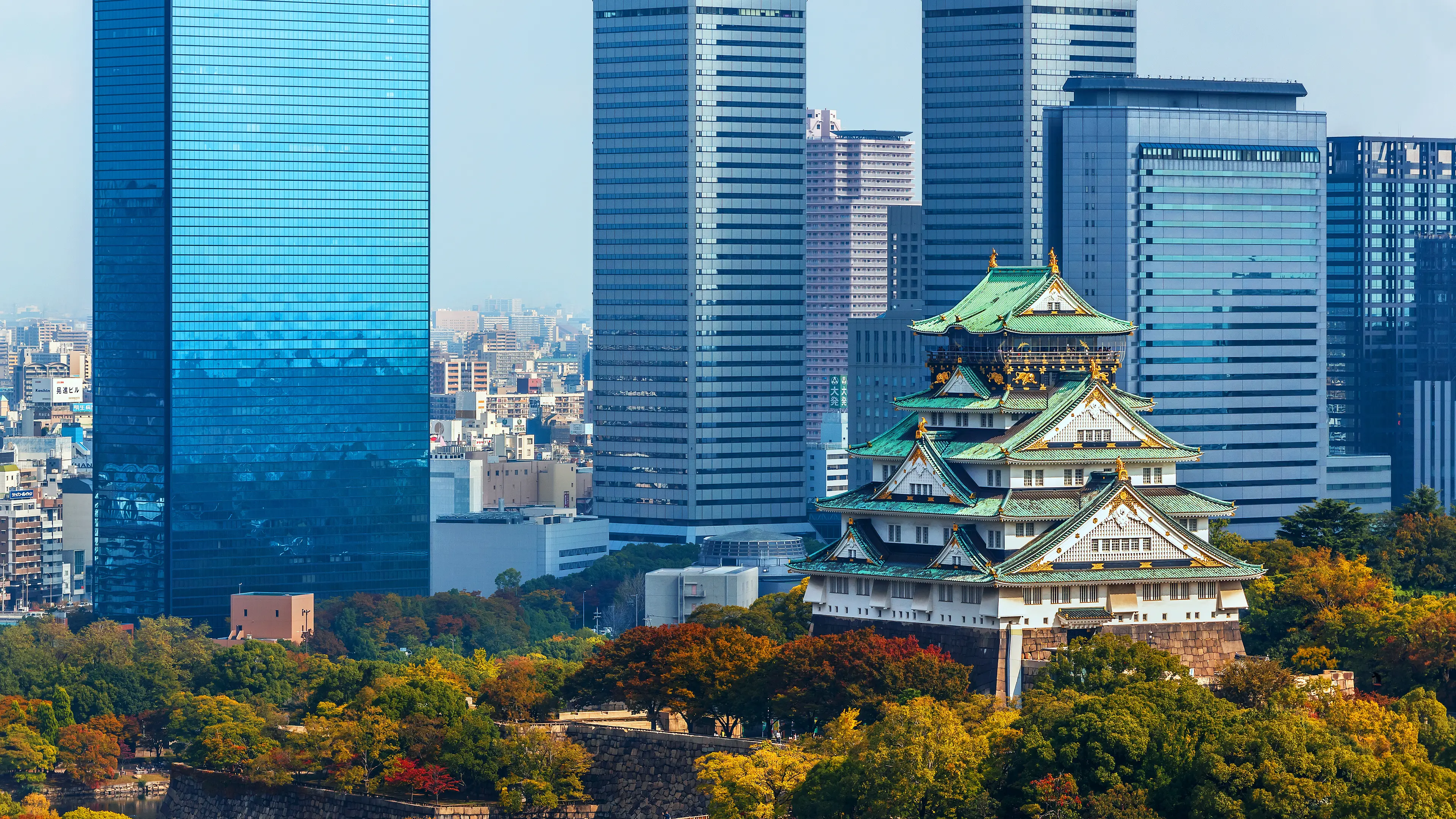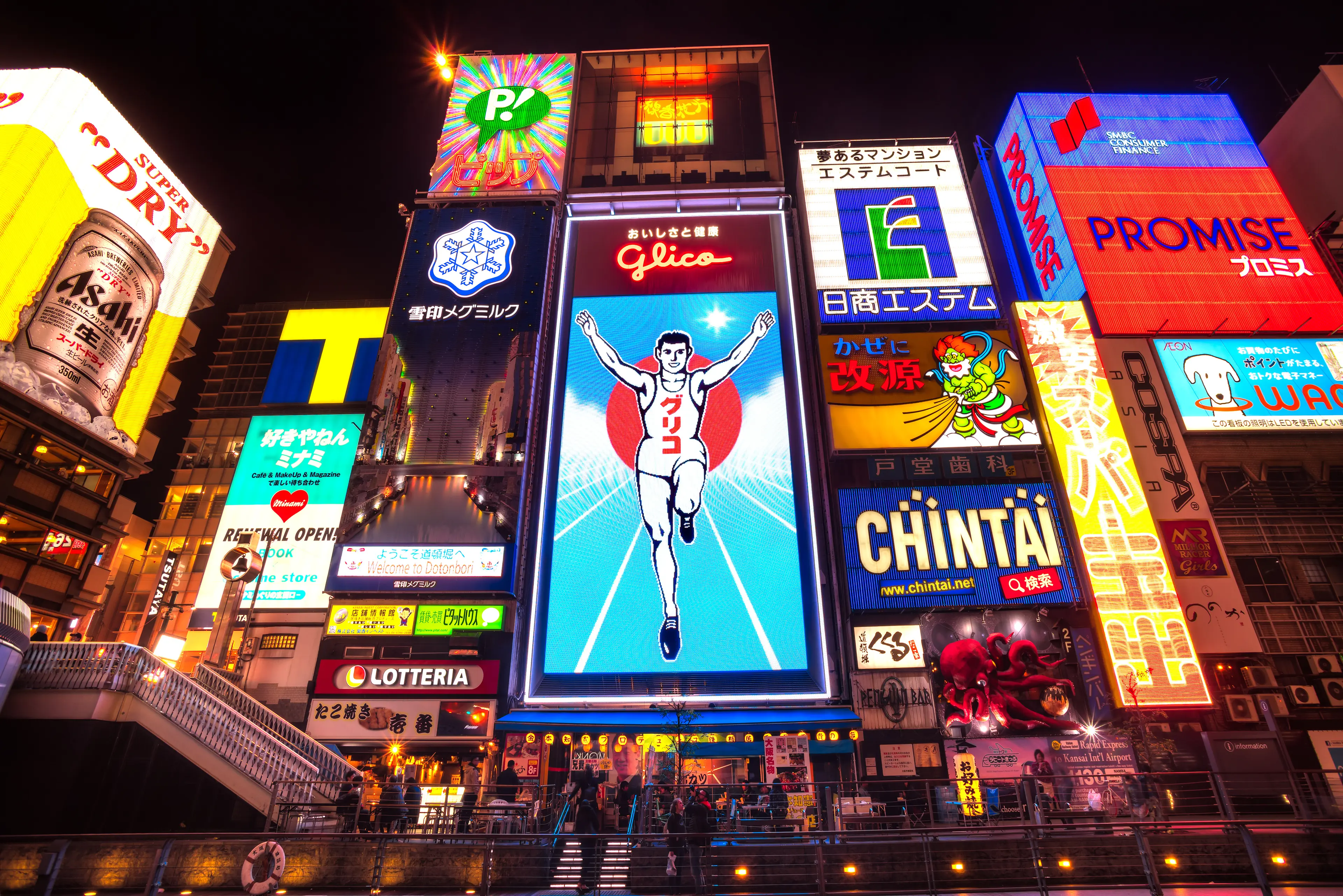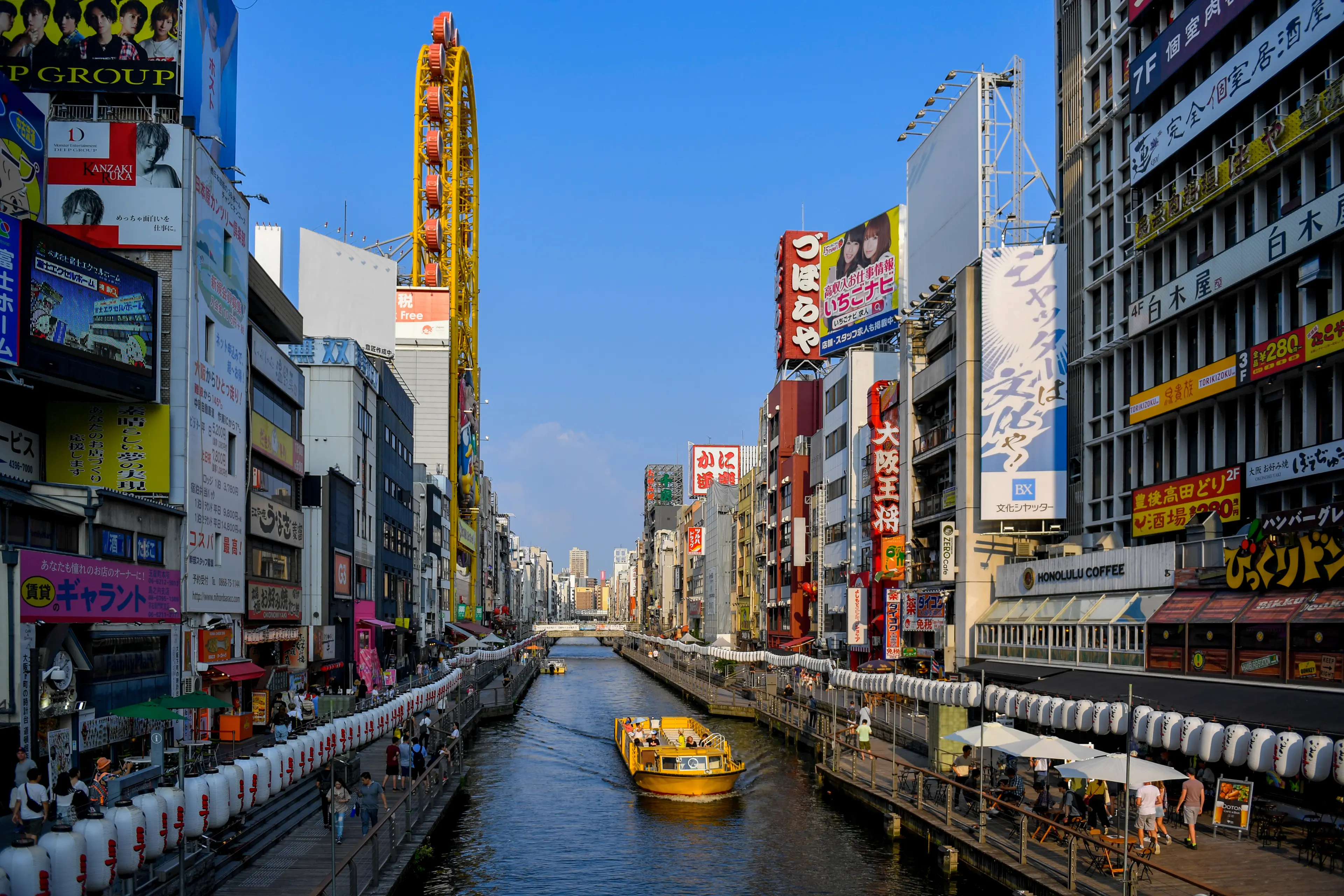1-Day Osaka Adventure and Culinary Experience for Couples
Osaka, Japan
1 days





About Osaka, Japan
Experience the vibrant culture and rich history of Osaka, Japan's third-largest city. Known for its modern architecture, nightlife, and hearty street food, Osaka is a bustling metropolis with a friendly, down-to-earth charm. Visit the iconic Osaka Castle, explore the futuristic Umeda Sky Building, or immerse yourself in the underwater world at the Osaka Aquarium Kaiyukan. Foodies will love Dotonbori, a street filled with local eateries serving Osaka's famous takoyaki and okonomiyaki. For shopping enthusiasts, Shinsaibashi offers a plethora of shops and boutiques. Don't miss Universal Studios Japan for a day of fun and entertainment. With its mix of traditional and contemporary attractions, Osaka provides a unique Japanese travel experience.
1-Day Itinerary
Attractions in Itinerary (3)

1Osaka Castle
A historic castle with a museum, beautiful gardens, and panoramic city views.

2Tsutenkaku Tower
Known as the 'Tower Reaching Heaven', Tsutenkaku is a symbol of Osaka and offers panoramic views of the city from its observation deck. The tower's design reflects both Japanese and Western architectural influences.

3Dotonbori Canal Boat Tour
A popular and scenic boat tour that takes you through the heart of Osaka's entertainment district, offering views of the city's iconic neon lights and the famous Glico Man sign.
Local Food and Drinks (12)

Takoyaki
A popular street food in Osaka, Takoyaki are ball-shaped snacks made of a wheat flour-based batter and cooked in a special molded pan. They are typically filled with minced or diced octopus, tempura scraps, pickled ginger, and green onion.

Okonomiyaki
Okonomiyaki is a savory pancake containing a variety of ingredients in a wheat-flour-based batter. It is an iconic dish of Osaka and is often compared to an omelette or a pizza.

Kushikatsu
Kushikatsu, also known as kushiage, is a Japanese dish of skewered, breaded and deep-fried meat, seafood, and vegetables. It's a specialty of the Shinsekai district of Osaka.

Negiyaki
Negiyaki is a type of Japanese pancake similar to okonomiyaki, but with a focus on green onions (negi). It's a popular dish in Osaka.

Yakiniku
Yakiniku is a style of barbecue that although is widely available throughout Japan, has a unique style and flavor in Osaka. It involves grilling bite-sized pieces of meat (usually beef) and vegetables over a flame of wood charcoals.

Kitsune Udon
Kitsune Udon is a noodle soup dish, popular in Osaka, featuring thick udon noodles and topped with aburaage (sweetened deep-fried tofu pockets), which are said to be the favorite food of kitsune (foxes) in Japanese folklore.

Doteyaki
Doteyaki is a traditional dish of Osaka, made by simmering beef sinew in miso and mirin until it becomes tender. It's a popular choice at izakaya (Japanese pubs).

Osaka Sushi
Osaka-style sushi tends to be more innovative and unique compared to the traditional Tokyo-style sushi. It often features preserved or marinated fish instead of fresh raw fish.

Ramen
While ramen is a popular dish all over Japan, Osaka has its own unique style. The broth tends to be lighter and soy-based, and it's often served with thick, chewy noodles.

Sake
Sake is a Japanese rice wine that is brewed using a unique method. Osaka, with its high-quality water sources, is known for producing some of the best sake in Japan.

Matcha Tea
Matcha is a type of powdered green tea that is highly appreciated throughout Japan. In Osaka, you can enjoy it in traditional tea ceremonies or as a casual drink.

Amazake
Amazake is a traditional sweet, low-alcohol Japanese drink made from fermented rice. It's often enjoyed during the New Year's holidays and is a popular drink in Osaka.
Best time to visit
The best time to visit Osaka, Japan is during the spring (March to May) and autumn (September to November) seasons. During these periods, the weather is typically mild and pleasant. Spring is particularly popular due to the beautiful cherry blossoms that bloom across the city. Autumn also offers stunning scenery with vibrant fall foliage. These seasons also have less rainfall compared to the summer months. However, it's worth noting that these are also peak tourist seasons, so popular attractions may be crowded.
How to get around
Osaka Metro
Osaka's extensive subway system, the Osaka Metro, is one of the most efficient ways to get around the city. It connects all major areas and attractions. Tickets can be purchased at machines in the stations.
JR Trains
The JR (Japan Railways) trains are another popular mode of transport. The JR Osaka Loop Line circles the city and stops at many popular tourist destinations. If you have a JR Pass, you can use it on these trains.
Bus
While not as fast as the metro or trains due to traffic, buses in Osaka can reach areas that the trains do not. They are also a good option for short distances.
Bicycle
Osaka is a bike-friendly city with many rental shops. It's a great way to explore the city at your own pace and get some exercise at the same time.
Taxi
Taxis are plentiful in Osaka and can be hailed on the street or found at taxi stands. They're a convenient but more expensive option, especially for longer distances.
Ridesharing
Ridesharing services like Uber are available in Osaka, but they are not as popular or widespread as in some other countries. They can be a good option if you're traveling with a group or have a lot of luggage.
Ferry
Osaka is a port city, and there are several ferry routes that can take you to nearby islands or across the bay. It's a scenic way to travel, especially on a nice day.
Foot
Many of Osaka's attractions are within walking distance of each other, especially in areas like Dotonbori and Namba. Walking is a great way to see the city and soak up the atmosphere.
Rental Car
Renting a car in Osaka can be useful if you plan to visit outlying areas or other cities, but it's not recommended for getting around the city itself due to traffic and parking costs.
Important information
Currency¥ JPY
Time zoneUTC+9
Driving sideLeft
Emergency phoneAmbulance: 119; Fire: 119; Police: 110
Drinking waterYes
Power sockets
Voltage100 V
Things to know about Osaka, Japan as a first time visitor
1
Osaka is Japan's third-largest city, known for its modern architecture, vibrant nightlife, and hearty street food.
2
The local dialect spoken in Osaka is called 'Osaka-ben'. It's different from standard Japanese, but most locals are bilingual in both dialects.
3
Osaka is famous for its food. Don't miss out on trying local specialties like takoyaki (octopus balls), okonomiyaki (savory pancake), and kushikatsu (deep-fried skewers).
4
Osaka has a humid subtropical climate. Summers (June - August) are hot and humid with temperatures ranging from 77°F - 91°F (25°C - 33°C), while winters (December - February) are cold with temperatures ranging from 32°F - 54°F (0°C - 12°C).
5
The city is well-connected by a comprehensive public transportation system. The Osaka Metro and JR Osaka Loop Line are the most convenient for tourists.
6
Taxis are widely available but can be expensive. It's recommended to use public transportation or rent a bicycle for short distances.
7
Credit cards are widely accepted in Osaka, but it's always a good idea to carry some cash as smaller establishments may not accept cards.
8
Tipping is not customary in Japan. In fact, it can sometimes be considered rude or confusing.
9
Osaka is generally safe, but like any major city, it's important to stay vigilant, especially in crowded areas.
10
Most people in Osaka do not speak fluent English, but many can understand basic English. It might be helpful to learn a few basic phrases in Japanese.
11
The voltage in Japan is 100 Volt, which is different from North America (120V), Central Europe (230V) and most other regions of the world. Make sure your devices are compatible or bring a voltage converter.
12
Smoking is not allowed on the streets in most areas in Osaka. Look for designated smoking areas instead.
13
The tap water in Osaka is safe to drink and of high quality.
14
Osaka has a high standard of cleanliness. Always look for a trash can to dispose of your waste. If you can't find one, it's customary to carry your trash with you until you can dispose of it properly.
15
Public Wi-Fi is not as common in Osaka as in some other major cities. Consider renting a pocket Wi-Fi or purchasing a local SIM card for internet access.
16
Convenience stores in Osaka are truly convenient. They offer a wide range of services from food and drinks to ATMs and postal services.
17
If you're planning to travel around Japan, consider getting a Japan Rail Pass. It can save you a significant amount of money on train travel.
18
In Osaka, it's customary to stand on the right side of escalators to let people pass on the left.
19
Many shops in Osaka open late in the morning around 10 or 11 am and stay open until 8 or 9 pm.
20
Osaka is a city that comes alive at night. Don't miss out on exploring the city's vibrant nightlife, especially in areas like Dotonbori and Shinsekai.
Basic Japanese to know as a first time visitor
English phrase | Native phrase | Pronunciation | When to use it |
|---|---|---|---|
Hello | こんにちは | Konnichiwa | Greeting someone |
Goodbye | さようなら | Sayonara | Leaving or parting ways |
Thank you | ありがとう | Arigatou | Expressing gratitude |
Please | お願いします | Onegaishimasu | Making a request |
Excuse me | すみません | Sumimasen | Getting attention or apologizing |
Yes | はい | Hai | Affirming or agreeing |
No | いいえ | Iie | Disagreeing or denying |
I don't understand | わかりません | Wakarimasen | When you don't understand something |
Do you speak English? | 英語を話せますか? | Eigo o hanasemasu ka? | Trying to find someone who speaks English |
I'm sorry | ごめんなさい | Gomen nasai | Apologizing |
Bathroom | トイレ | Toire | Looking for a bathroom |
Help | 助けて | Tasukete | In an emergency |
Food | 食べ物 | Tabemono | Talking about food |
Water | 水 | Mizu | Asking for water |
Check, please | お会計お願いします | Okaikei onegaishimasu | Requesting the bill at a restaurant |
How much? | いくらですか | Ikura desu ka | Asking the price of something |
Where is...? | ...はどこですか | ... wa doko desu ka | Asking for directions |
Train station | 駅 | Eki | Looking for a train station |
Good morning | おはようございます | Ohayou gozaimasu | Greeting someone in the morning |
Good night | おやすみなさい | Oyasuminasai | Saying goodnight or going to bed |
Packing List
Clothing
Comfortable walking shoes
Lightweight clothing
Rain jacket or umbrella
Sunglasses
Hat for sun protection
Toiletries
Travel-size toothpaste
Toothbrush
Travel-size shampoo and conditioner
Deodorant
Travel-size body wash or soap
Razor
Travel-size lotion
Sunscreen
Hand sanitizer
Face mask
Travel documents and essentials
Passport
Driver's license or ID card
Credit and debit cards
Cash (Japanese Yen)
Travel insurance documents
Hotel reservation confirmation
Emergency contacts and addresses in Osaka
Electronics and gadgets
Smartphone
Charger for smartphone
Power bank
Headphones
Camera
Charger for camera
Universal travel adapter
Miscellaneous items
Snacks
Water bottle
Travel guidebook for Osaka
Japanese phrasebook
Backpack or daypack
Travel pillow
Earplugs
Eye mask
Weather Conditions
Osaka, Japan experiences a humid subtropical climate with four distinct seasons, which can greatly impact your travel plans. Spring (March to May) is a beautiful time to visit Osaka, with temperatures ranging from 50°F to 70°F (10°C to 21°C). You'll witness cherry blossoms in full bloom, but it's also a popular time for tourists, so expect crowds. Pack a light jacket for the cooler evenings. Summer (June to August) can be hot and humid, with temperatures often exceeding 90°F (32°C). It's also the rainy season, especially in June and July, so pack an umbrella or raincoat. Despite the weather, summer is a great time to experience traditional Japanese festivals. Autumn (September to November) offers mild temperatures between 60°F and 80°F (15°C and 27°C), making it an ideal time for sightseeing. The fall foliage is also a beautiful sight. Light clothing with a few warmer layers for the cooler evenings is recommended. Winter (December to February) can be quite cold, with temperatures ranging from 35°F to 50°F (2°C to 10°C). Snow is rare but possible. If you're visiting during this time, pack warm clothing, including a coat, gloves, and a hat. Regardless of when you visit, it's always a good idea to check the forecast before your trip to ensure you're prepared for the weather. Remember, Osaka's weather can be unpredictable, so packing a variety of clothing options is always a good idea. Enjoy your trip to this vibrant city!
| Month | Hi / Lo (°C) | Weather Overview |
|---|---|---|
January | 11° / 1° | January is the coldest month in Osaka, with occasional snowfall. It's a great time to visit if you enjoy cooler weather and fewer crowds. |
February | 12° / 2° | February is still quite cold, with occasional snowfall. The plum blossoms start to bloom towards the end of the month, making it a beautiful time to visit. |
March | 15° / 5° | March sees the arrival of spring, with temperatures gradually warming up. Cherry blossoms start to bloom towards the end of the month, making it a popular time for tourists. |
April | 20° / 10° | April is a pleasant month with mild temperatures and cherry blossoms in full bloom. It's a great time to visit parks and enjoy outdoor activities. |
May | 25° / 15° | May is warm and comfortable, with plenty of sunshine. It's a great time to explore the city and enjoy outdoor activities. |
June | 30° / 20° | June marks the start of the rainy season, with high humidity and frequent showers. Despite the rain, it's a great time to visit indoor attractions like museums and shopping centers. |
July | 35° / 25° | July is hot and humid, with occasional typhoons. It's a great time to visit the beach or enjoy indoor activities. |
August | 36° / 26° | August is the hottest month, with high humidity and occasional typhoons. Despite the heat, it's a great time to visit the beach or enjoy indoor activities. |
September | 32° / 22° | September marks the end of the hot summer, with temperatures gradually cooling down. It's a great time to visit as the autumn foliage starts to appear. |
October | 25° / 15° | October is a pleasant month with mild temperatures and beautiful autumn foliage. It's a great time to explore the city and enjoy outdoor activities. |
November | 20° / 10° | November is cool and comfortable, with beautiful autumn foliage. It's a great time to explore the city and enjoy outdoor activities. |
December | 15° / 5° | December is cool and comfortable, with occasional snowfall. It's a great time to visit if you enjoy cooler weather and fewer crowds. |
Did you know?
Places near by Osaka, Japan

Nara Park
Famous for its free-roaming deer and historical temples.

Kobe Harborland
A shopping and entertainment district along the waterfront of Kobe's port area.

Himeji Castle
A hilltop Japanese castle complex situated in the city of Himeji.

Kyoto Imperial Palace
The former ruling palace of the Emperor of Japan.

Mount Koya
The center of Shingon Buddhism, an important Buddhist sect which was introduced to Japan in 805 by Kobo Daishi.

Okayama Korakuen
One of the Three Great Gardens of Japan, located in Okayama City.

Amanohashidate
One of Japan's three scenic views. The sandbar is located in Miyazu Bay in northern Kyoto Prefecture.

Shirahama Beach
One of the most famous beaches in Japan, known for its white sand imported from Australia.

Naoshima
Famous for its modern art museums, architecture and sculptures.

Mount Yoshino
Japan's most famous cherry blossom spot with over 30,000 cherry trees.